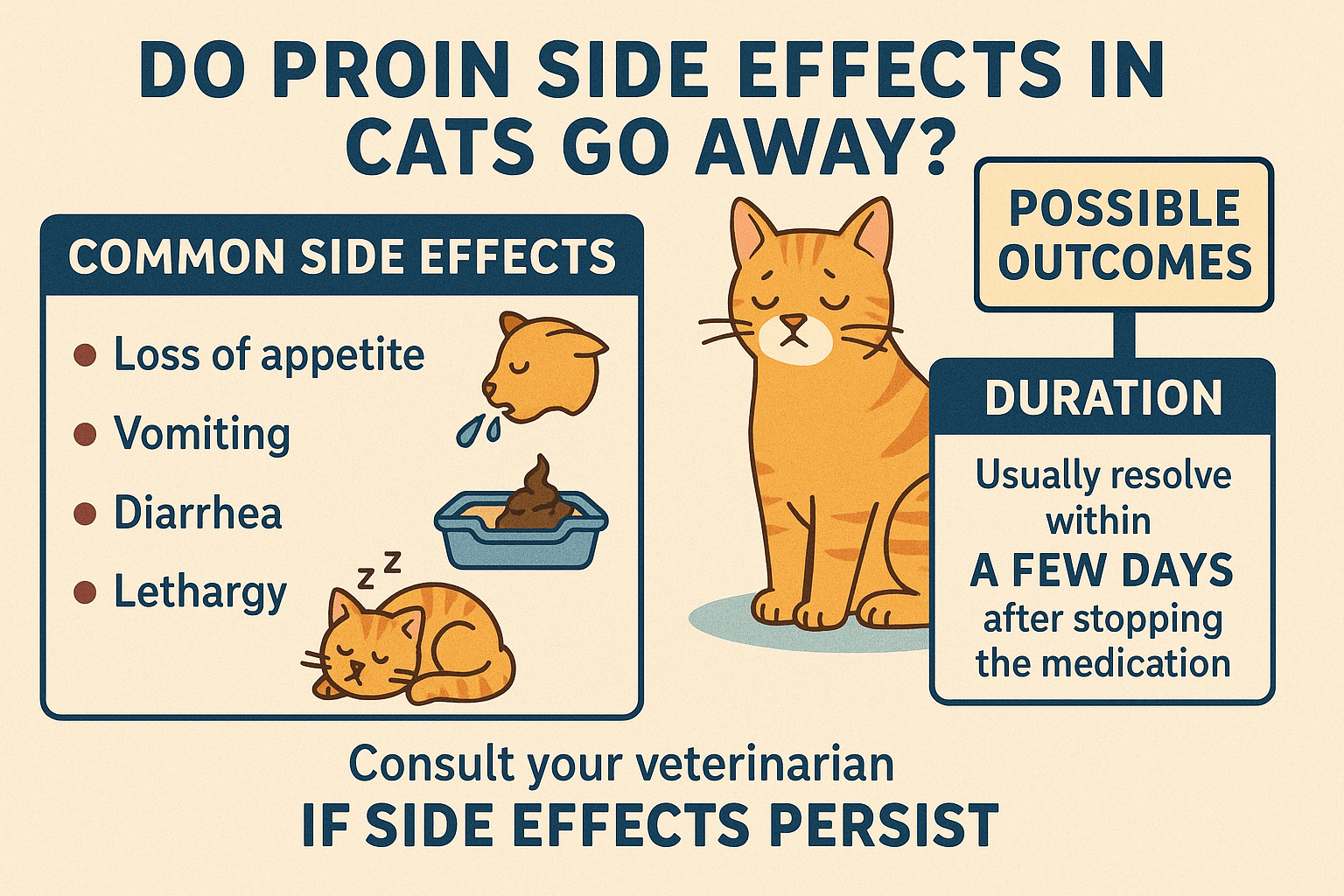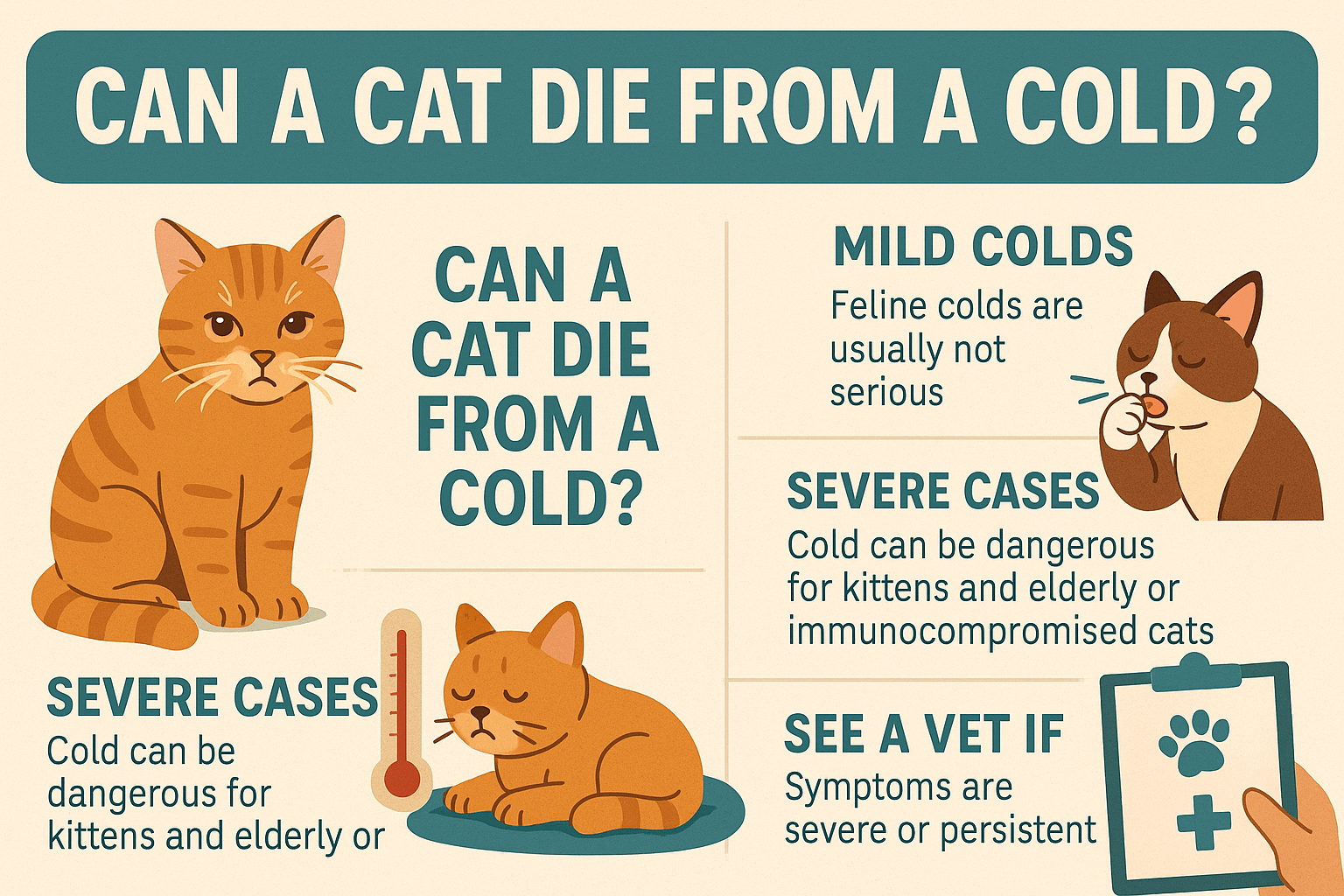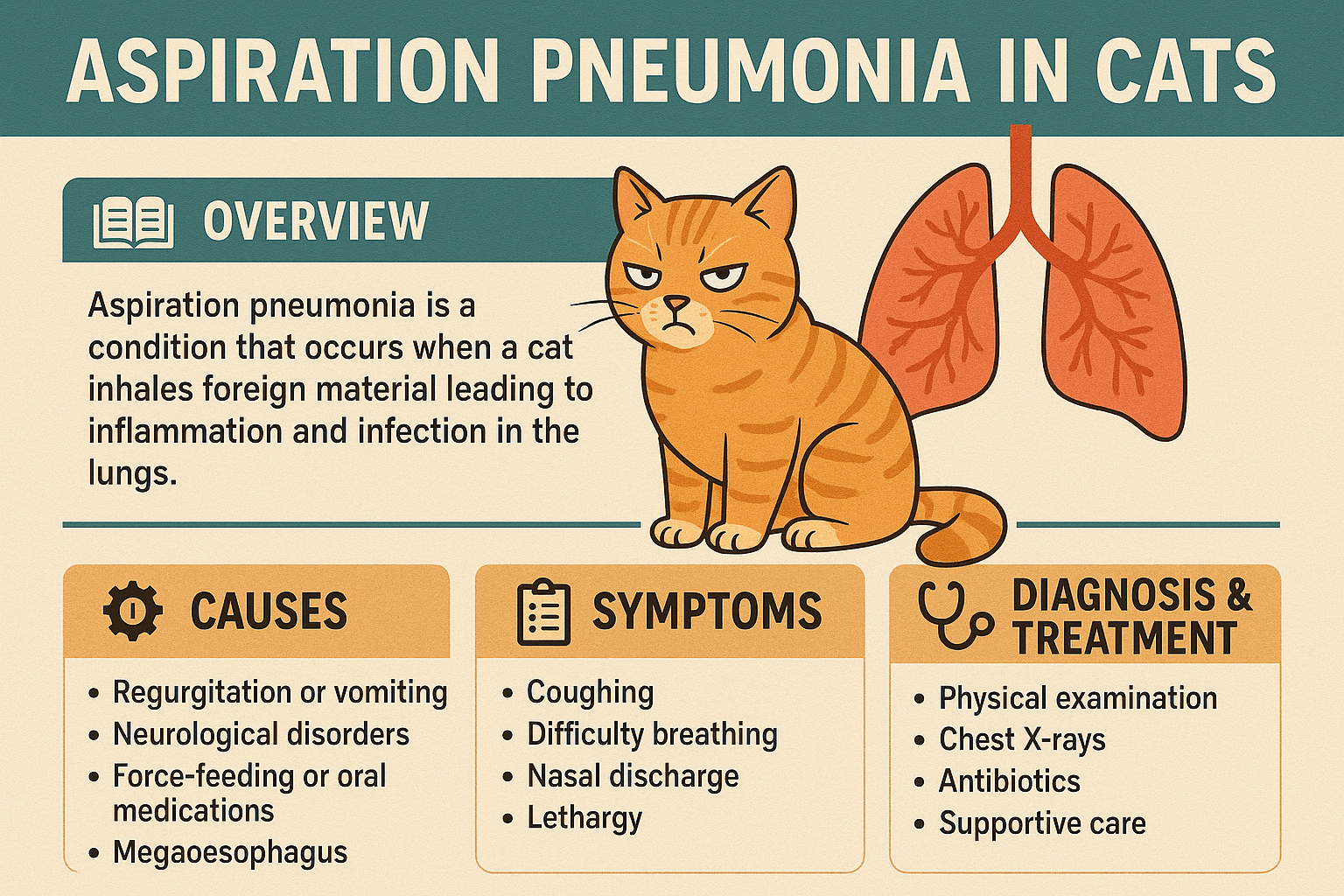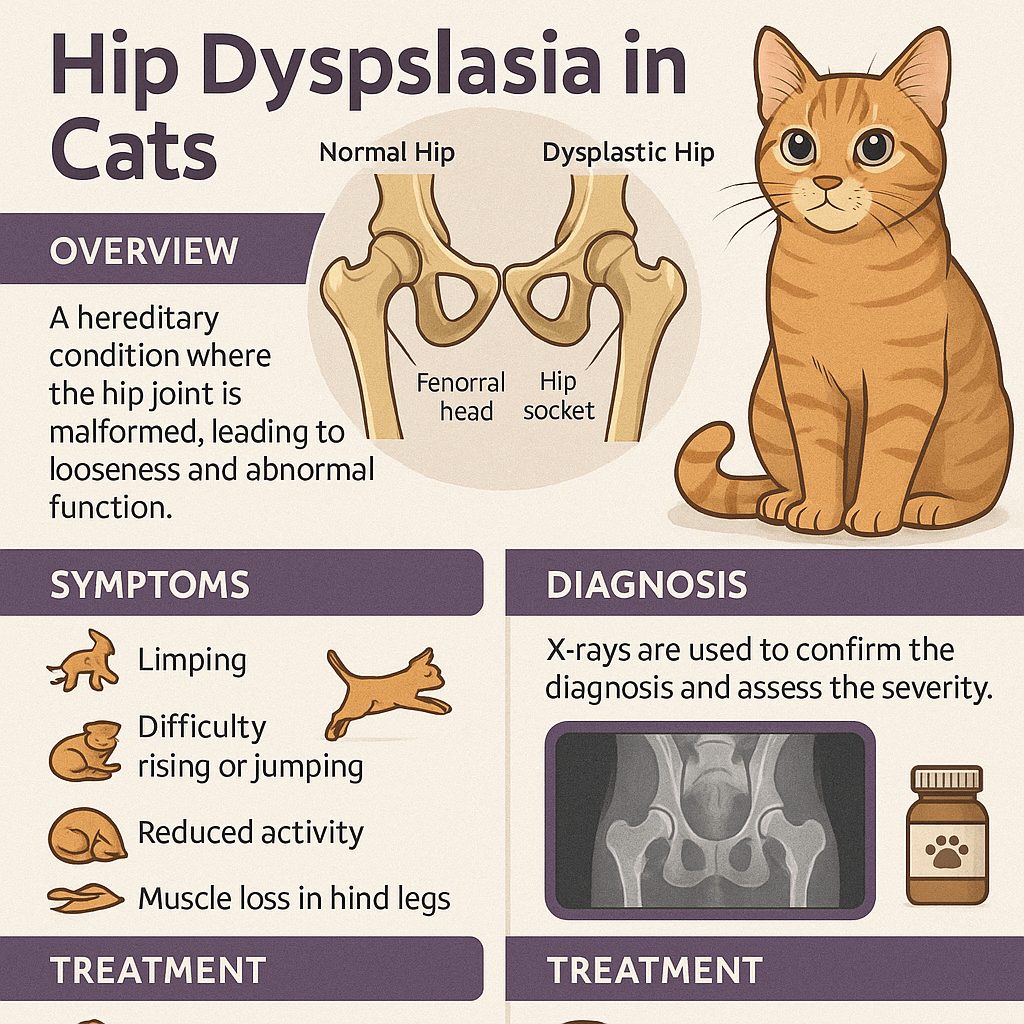Do Proin Side Effects in Cats Go Away?
If your cat has been prescribed Proin (phenylpropanolamine) for urinary incontinence or other conditions, you may be concerned about potential side effects. While Proin can be highly effective in managing these issues, it’s natural to wonder whether the side effects are temporary or long-lasting. Understanding how Proin affects your cat and what to expect during treatment is crucial for ensuring their comfort and well-being. In this blog post, we’ll explore common side effects, how they typically resolve, and steps you can take to support your feline companion throughout their treatment journey.
Common Side Effects of Proin in Cats
Like any medication, Proin can cause side effects in cats. Most of these are mild and manageable, but it’s important to recognize them early to address any concerns promptly.
Increased Thirst and Urination:
Cats on Proin may drink more water and urinate more frequently as their bodies adjust to the medication.Loss of Appetite:
Some cats experience a temporary decrease in appetite, which can lead to reduced food intake during the initial days of treatment.Vomiting or Nausea:
Gastrointestinal upset, such as vomiting or nausea, is a common side effect that often diminishes over time.Restlessness or Anxiety:
Proin can sometimes cause behavioral changes, including restlessness or heightened anxiety, especially in sensitive cats.Lethargy or Fatigue:
A cat may appear unusually tired or less active during the first few days of starting Proin.
While these side effects can be concerning, most cats adapt to the medication within a short period, and symptoms tend to subside as their bodies acclimate.
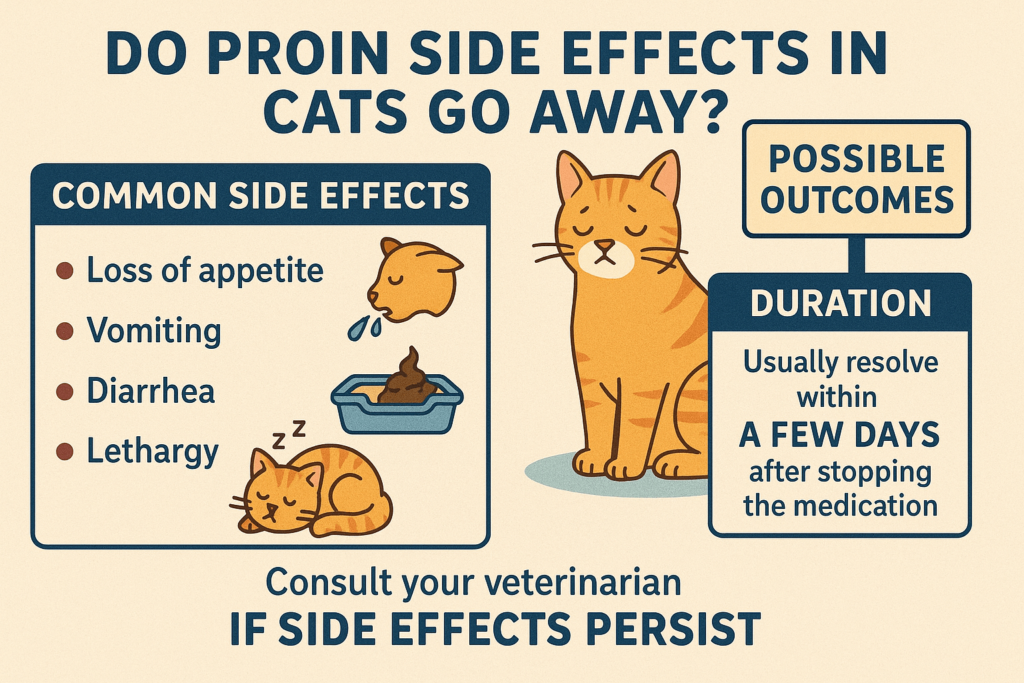
How Long Do Proin Side Effects Typically Last?
The duration of Proin side effects in cats varies depending on the individual and their response to the medication. Here’s what you can generally expect during the adjustment phase.
First Few Days:
Most side effects occur within the first 2-3 days of starting Proin, as the body begins processing the medication.One Week Mark:
By the end of the first week, many cats show significant improvement, with side effects becoming less frequent or severe.Two Weeks or Longer:
In some cases, mild side effects may persist for up to two weeks, particularly in cats with underlying health conditions.Monitoring Behavioral Changes:
Keep an eye on your cat’s behavior and habits during this period, as prolonged or worsening symptoms may indicate a need for veterinary consultation.Individual Differences:
Every cat responds differently to medications, so the timeline for resolving side effects can vary widely.
With patience and careful observation, most cats successfully adjust to Proin without long-term issues.
Check this guide 👉Buprenorphine Cat Side Effects: Best 7 Expert Tips!
Check this guide 👉Cat Leukemia Vaccine Side Effects: Best 7 Expert Tips!
Check this guide 👉Dog Thyroid Medication Side Effects: Best 7 Expert Tips!
Short-Term Side Effects | Long-Term Considerations |
|---|---|
Increased thirst and urination | Potential need for dose adjustments |
Temporary loss of appetite | Monitoring for chronic gastrointestinal issues |
Mild vomiting or nausea | Ensuring hydration and kidney health |
Restlessness or anxiety | Addressing behavioral changes with vet guidance |
Lethargy or fatigue | Watching for signs of ongoing discomfort |
Tips for Managing Proin Side Effects in Cats
If your cat experiences side effects from Proin, there are several steps you can take to help them feel more comfortable and speed up their adjustment process.
Provide Fresh Water:
Encourage hydration by keeping fresh water available at all times, especially if your cat is drinking more than usual.Offer Small, Frequent Meals:
Instead of large portions, provide smaller meals throughout the day to entice your cat to eat despite a reduced appetite.Monitor Bathroom Habits:
Keep track of your cat’s urination patterns to ensure they’re not experiencing dehydration or urinary issues.Create a Calm Environment:
Reduce stress by maintaining a quiet, peaceful space where your cat can relax during the adjustment period.Consult Your Veterinarian:
If side effects persist or worsen, contact your vet immediately to discuss possible alternatives or adjustments to the dosage.
By taking proactive measures, you can minimize discomfort and support your cat’s recovery while they adapt to Proin.
When to Seek Veterinary Help for Proin Side Effects
While most side effects of Proin are mild and temporary, some symptoms may require immediate attention. Knowing when to consult your veterinarian ensures your cat receives timely care.
Persistent Vomiting or Diarrhea:
If your cat vomits multiple times a day or develops diarrhea, it could indicate an adverse reaction to the medication.Severe Lethargy:
Extreme fatigue or unresponsiveness is a red flag that warrants urgent veterinary evaluation.Difficulty Breathing:
Labored breathing or wheezing after starting Proin should never be ignored, as it may signal an allergic reaction.Refusal to Eat or Drink:
A complete lack of appetite or refusal to drink water for more than 24 hours requires immediate attention.Behavioral Changes Beyond Restlessness:
Aggression, confusion, or unusual aggression may indicate neurological issues related to the medication.
Recognizing these warning signs helps safeguard your cat’s health and ensures prompt intervention if needed.
Signs Your Cat Is Adjusting Well to Proin
When your cat starts taking Proin, certain signs indicate that they’re adapting well to the medication. Recognizing these positive indicators can reassure you that the treatment is working effectively.
Stable Eating Habits:
A return to normal eating patterns suggests your cat is no longer affected by appetite-related side effects.Consistent Energy Levels:
If your cat regains their usual energy and playfulness, it’s a good sign they’re adjusting to the medication.No Excessive Thirst or Urination:
Normal water consumption and bathroom habits indicate your cat’s body is stabilizing.Improved Comfort During Rest:
Observing relaxed sleeping positions and calm behavior shows your cat feels at ease.Positive Response to Interaction:
Increased sociability and affection toward family members reflect emotional well-being.
These signs confirm that your cat is thriving despite the initial challenges of starting Proin.
Alternative Treatments for Urinary Incontinence
If Proin proves unsuitable for your cat due to persistent side effects, alternative treatments may be worth exploring. These options aim to address urinary incontinence without relying solely on medication.
Dietary Adjustments:
Specialized diets rich in omega-3 fatty acids and antioxidants can support bladder health naturally.Herbal Supplements:
Certain herbs, like marshmallow root or cranberry extract, may help strengthen urinary tract function.Behavioral Therapy:
Training techniques can assist in managing accidents caused by stress-related incontinence.Environmental Modifications:
Adding more litter boxes around the house reduces stress and encourages regular bathroom use.Veterinary Procedures:
Surgical interventions or advanced therapies may be recommended for severe cases.
Exploring these alternatives provides additional paths to managing your cat’s condition effectively.
Preventive Measures to Minimize Side Effects
Taking preventive steps before and during Proin treatment can significantly reduce the likelihood or severity of side effects. These measures focus on supporting your cat’s overall health and well-being.
Gradual Introduction of Medication:
Start with a lower dose under veterinary supervision to allow your cat’s body to adapt gradually.Regular Vet Check-Ups:
Schedule routine visits to monitor your cat’s progress and make necessary adjustments to the treatment plan.Hydration Support:
Offer wet food or flavored water to encourage adequate fluid intake and prevent dehydration.Minimize Environmental Stressors:
Maintain a stable and predictable environment to reduce anxiety, which can exacerbate side effects.Track Symptoms Daily:
Keep a journal of your cat’s behavior, appetite, and bathroom habits to identify trends or concerns early.
By implementing these strategies, you can proactively manage your cat’s health and minimize the impact of Proin side effects.
Frequently Asked Questions About Proin Side Effects in Cats
Are Proin side effects permanent?
No, most side effects are temporary and resolve as your cat adjusts to the medication.
Can I stop giving Proin if my cat has side effects?
Always consult your vet before discontinuing Proin, as stopping abruptly may worsen the condition it was prescribed for.
What should I do if my cat vomits after taking Proin?
Monitor your cat closely and contact your vet if vomiting persists or occurs frequently.
Is increased thirst normal with Proin?
Yes, increased thirst is a common side effect and usually subsides as your cat adapts to the medication.
How can I make Proin easier for my cat to tolerate?
Administer the medication with food or use pill pockets to mask the taste and reduce resistance.
Supporting Your Cat Through Proin Treatment
While Proin can occasionally cause side effects in cats, most are mild and resolve as your cat adjusts to the medication. By staying vigilant, providing supportive care, and consulting your veterinarian when needed, you can ensure your cat remains healthy and comfortable throughout their treatment. Remember, every cat is unique, and patience is key to navigating the challenges of medication management. With proper care and attention, Proin can help improve your cat’s quality of life without compromising their well-being.
Can a Cat Die from a Cold? Best 7 Expert Tips! Learn how to identify, treat, and prevent feline colds while understanding when to seek veterinary care for your cat’s health.
Cat Screaming for Food: What’s Normal and What You Can Do If you’ve ever been woken up by your cat’s loud …
Aspiration Pneumonia in Cats: Best 7 Expert Tips! Discover causes, symptoms, and treatment advice to protect your cat’s respiratory health and ensure a speedy recovery.
Hip Dysplasia in Cats: Best 7 Expert Tips! Discover expert advice on managing hip dysplasia in cats, from symptoms and prevention to treatment options for a happier, healthier feline life.

